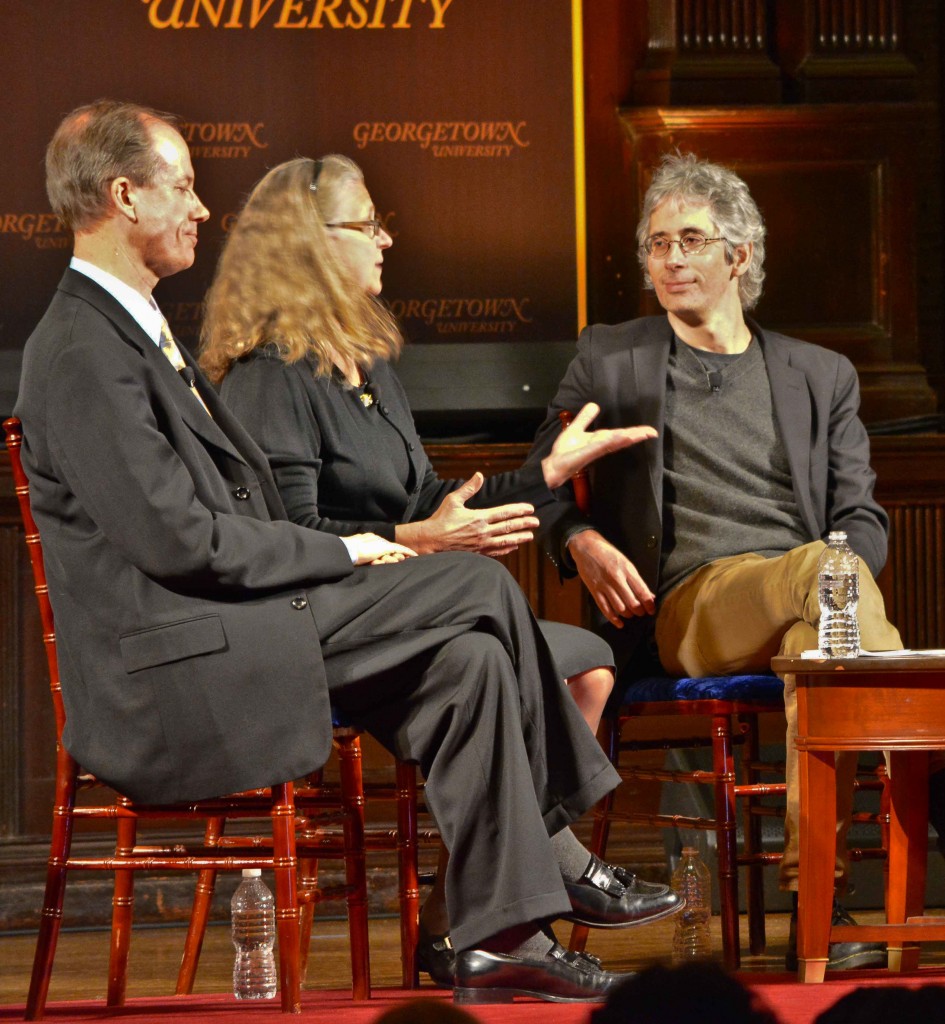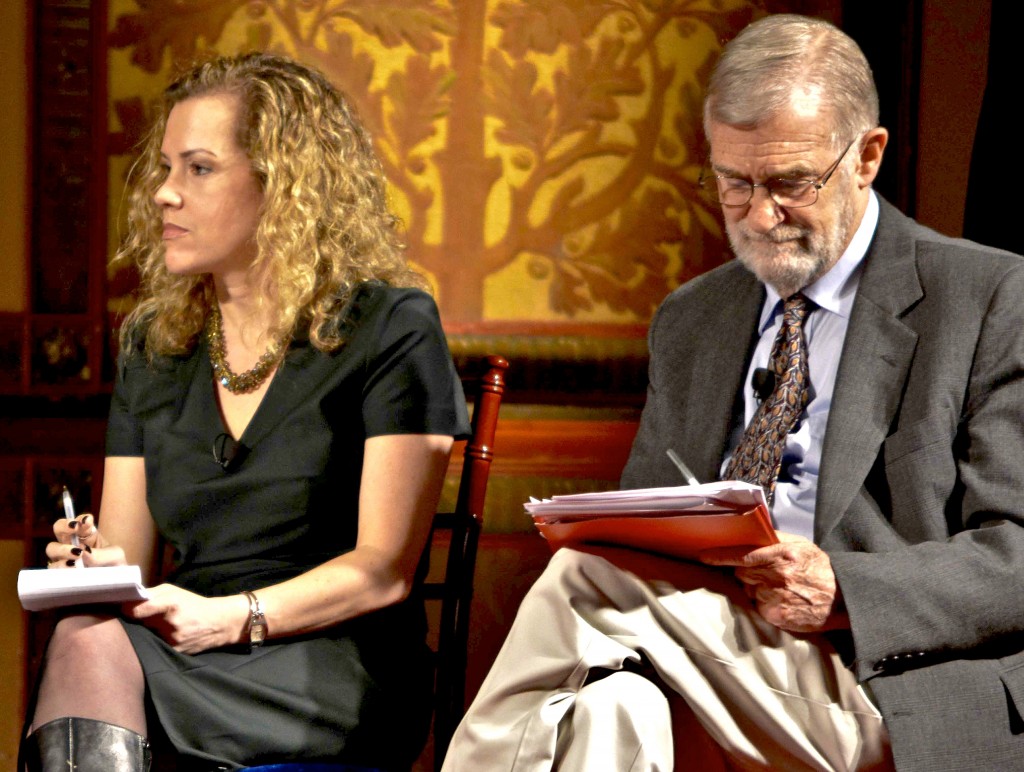
L-R: Thomas Drake, Coleen Rowley, Antony Arnove, Daniel Ellsberg, Jesselyn Radack, and Ray McGovern, 22 Apr 2014, Georgetown U. Photo by Linda Lewis
Four national security whistleblowers and a former CIA analyst appeared onstage Tuesday at Georgetown University’s Gaston Hall for a roundtable discussion, “Beyond Orwell: Surveillance, Secrets & Whistleblowing in the Security State.”
Keynote speaker Daniel Ellsberg, the famed “Pentagon Papers whistleblower,” fired a broadside at the political establishment, saying the republic has been lost. An “executive coup” occurred on or before 9/11, he said, with the result that “elected monarchs” now rule through secret law. Ellsberg criticized Congress, the judiciary and journalists for failing to hold officials accountable for executive branch abuses of power.

Daniel Ellsberg, keynote speaker, “Beyond Orwell” at Georgetown University, 22 April 2014. Photo by Linda Lewis.
In a taped video, journalist Glenn Greenwald joined Ellsberg in rebuking Senators Ron Wyden (D-OR) and Mark Udall (D-CO) who “ran around the country for three years winking and hinting and doing everything they could to imply and suggest that something was very awry in the U.S.surveillance state” without substantive results, Greenwald said.
“Mark Udall and Ron Wyden lacked the courage to do what they should have done, which is, gone to the floor of the Senate, invoke the immunity that the Constitution gives them, and reveal this information,” Greenwald said to a smattering of applause. “There has been a climate of fear deliberately created by the United States government” to prevent whistle-blowing, he added. (DefenseOne.com)
The failure of intelligence committee members to tell the public what they presumably knew about over-reaching NSA surveillance placed the burden of disclosing abuses on NSA and NSA contractor employees. But, “proper channels” for intelligence whistleblowing led ultimately back to the Congress, creating a closed loop from which truth was unlikely to emerge. Ultimately, the truth about mass surveillance surfaced when an NSA contractor with no immunity from prosecution or reprisal courageously volunteered to blow the whistle outside channels. President Obama, who initially pledged to support whistleblowers, joined intelligence officials in maligning the truthteller, Edward Snowden, with false claims, and his administration has charged Snowden with espionage.
Moderator Anthony Arnove asked the panelists, “How did we get to this moment where a constitutional law professor is carrying out these policies, and what does it mean for the next administration?”

Thomas Drake and Coleen Rowley with Anthony Arnove, Georgetown University, April 22, 2014. Photo by Linda Lewis
“Let’s be crystal clear,” responded Thomas Drake. “9/11 was a trigger to suspend the Constitution. We’ve been operating under emergency powers ever since, truth be told.” The former NSA executive was charged with espionage when he made a disclosure through “proper channels.” The charges were dropped, but Drake’s federal career was toast.
“I am living proof of what happens when you exhaust every single avenue, every single proper channel, every single statute that exists,” said Drake, “and still they retaliated.”
Ray McGovern, a former CIA analyst who declines being labeled a “whistleblower,” reminded audience members of past abuses of authority, citing the monitoring of Martin Luther King, Jr. with authorization by J. Edgar Hoover and Bobby Kennedy. Referring to a conversation with Coleen Rowley, McGovern said Hoover “had the goods on Bobby, Jack and all of the young ladies he was cavorting with. Martin Luther King Jr. was subjected to surveillance because Bobby Kennedy and Jack Kennedy were afraid Hoover would divulge things.”
McGovern speculated that Obama, too, is acting out of fear of reprisal. He said he was “informed of a meeting before the last election of twelve very wealthy progressive contributors having dinner with Obama…who were pinging on him, ‘You’re supposed to be a progressive; what are you doing?’…who reportedly said, ‘Don’t you remember what happened to Martin Luther King, Jr.?'”
Jesselyn Radack admitted to voting for Obama but now sees him in a different light. “At first I thought he was captured by the intelligence and national security establishments, which saw him as weak coming into office. But, I think he’s quite intoxicated with his powers, and right now in this digital age that we’re in, information is the currency of power,” said Radack. The former Justice Department lawyer and whistleblower now represents Edward Snowden and works for the Government Accountability Project.
As an FBI agent, Coleen Rowley blew the whistle on intelligence failures leading up to the 9/11 terrorist attacks. Now retired, she urged listeners to dispel the “myth” that preserving Constitutional rights makes us less secure. “Terrorist attacks are more likely to happen with this massive collect it all.” As an example, Rowley pointed to last year’s Boston bomb attack. Federal officials were so mired in tracking Occupy activists, she said, that they failed to give proper attention to a useful lead provided by Russians.
“It doesn’t matter which party” is in power, Rowley said and pointed to surveillance abuses under President Richard Nixon, a Republican.
“If you look historically at the Viet Nam-Watergate-Church Committee era… some things did change. It was Nixon leaving–in shame. It was the Church Committee. It was Hoover dying in 1972. All of those things kind of came together. A lot of people, because there was a draft, were out in the streets. There were several factors, and I think it was a combination of those things.”
Rowley added, “Now how do we replicate that period of time where we would actually be in a position to effect some kind of change? That’s what we have to look at, and try to see how we can get back to that point.”
# # #
Thanks to the event co-sponsors, the Georgetown Lecture Fund, Center for Muslim Christian Understanding, the GUSA Fund, the Department of Government, The Program on Justice and Peace, the Student Lecture Fund, and the Department of History at American University, who invited the public to attend without charge.

